Are you in search of a canine companion that possesses unwavering loyalty and a natural protective instinct? Look no further than the remarkable Cane Corso.
Known affectionately as the Italian Mastiff, this magnificent breed boasts a rich history dating back to ancient Rome, where they were revered as formidable guard dogs.
Standing tall and robust, the Cane Corso exudes strength and power. But there is so much more to this breed than meets the eye.
In this discussion, we will unravel the intriguing information and distinctive characteristics of the Cane Corso, leaving you eager to uncover the secrets behind this majestic breed.
Key Takeaways
- The Cane Corso, also known as the Italian Mastiff, is a large and muscular dog breed originating from Italy.
- They are known for their serious and docile temperament with their owners, but can be wary and suspicious of strangers.
- Socialization and training from an early age are important for Cane Corsos, as they are highly intelligent and require firm leadership to prevent dominance.
- Cane Corsos have specific health considerations, such as being prone to hip dysplasia, heart disease, and certain types of cancer. Regular vet checkups and awareness of these health problems are crucial.
Breed Overview
The Cane Corso, also known as the Italian Mastiff, is a large and sturdy dog breed with a rich history dating back to ancient Rome. This Italian breed is widely recognized for its muscular build and impressive stature. Standing between 23 to 27 inches tall and weighing 90 to 120 pounds, the Cane Corso is a powerful dog. Some puppies may even grow to be larger, exceeding 130 pounds and earning the nickname King Corso.
As a working breed, Cane Corsos were originally used as guard dogs, and their protective instincts still shine through today. With their owners, they’re attentive, serious, and docile, but they can be aloof or suspicious towards strangers. It’s important to provide early socialization and training to help them become well-rounded dogs.
Physical Characteristics
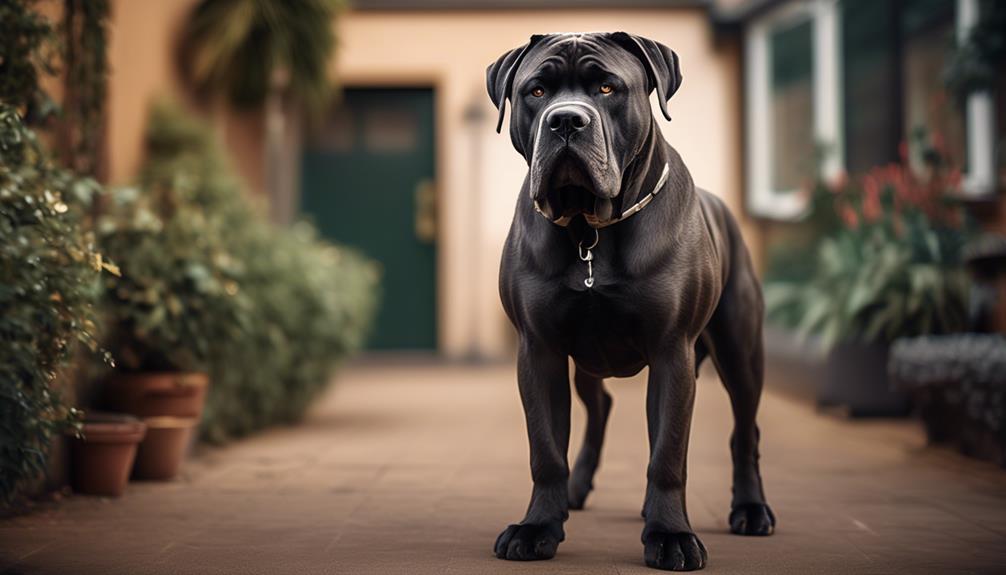
As we shift our focus to the physical characteristics of the Cane Corso, it’s important to understand the impressive attributes that make this breed stand out.
Here are the key features that define the appearance of a Cane Corso:
- Size: The Cane Corso is a large Italian dog breed, standing between 23 and 27 inches tall and weighing between 90 and 120 pounds. Some puppies may even grow into King Corsos, exceeding 130 pounds in weight.
- Muscular Build: This breed is known for its sturdy and muscular physique. With a well-developed chest and strong limbs, the Cane Corso exudes power and agility.
- Coat: The Cane Corso has a short, dense, and smooth coat. It comes in various colors, including black, brindle, fawn, or red. The coat requires minimal grooming, with regular brushing to remove loose hair and maintain coat health.
These physical characteristics contribute to the overall impressive and imposing presence of the Cane Corso breed.
Temperament Traits
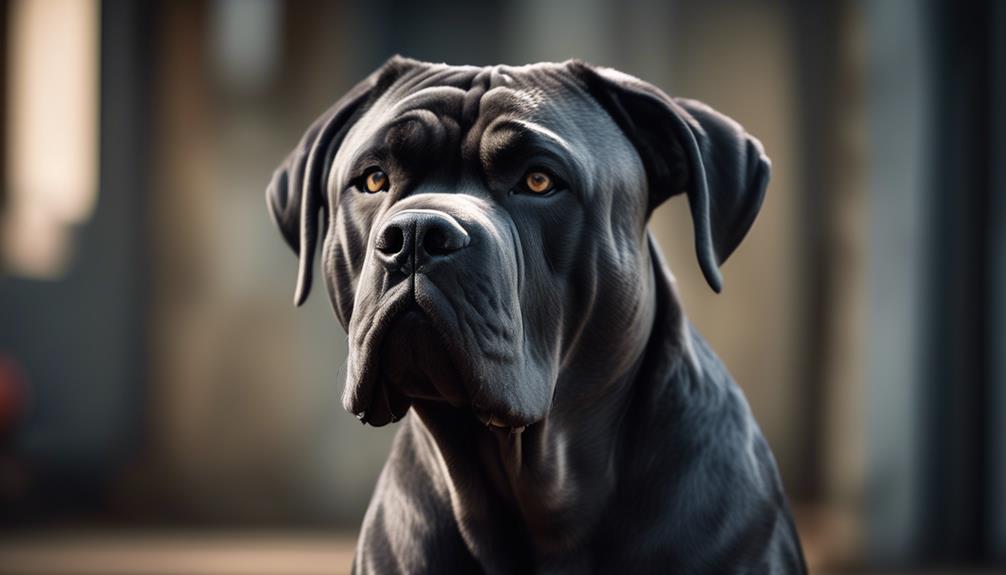
With their attentive and serious nature, Cane Corsos form strong bonds with their owners and exhibit a docile temperament. They’re wary and confident around strangers, making them excellent guard dogs. However, they can be aloof or suspicious towards unfamiliar individuals.
When it comes to their own family, especially children, Cane Corsos are docile and affectionate. It’s important to provide them with socialization and training from an early age to prevent any potential behavioral issues. They’re highly intelligent and can be bossy, so firm leadership and boundaries are necessary to prevent dominance.
Cane Corsos respond well to praise, rewards, and consistent enforcement of rules. It’s important to note that they don’t do well with people who are afraid of or dislike dogs.
Socialization and Training
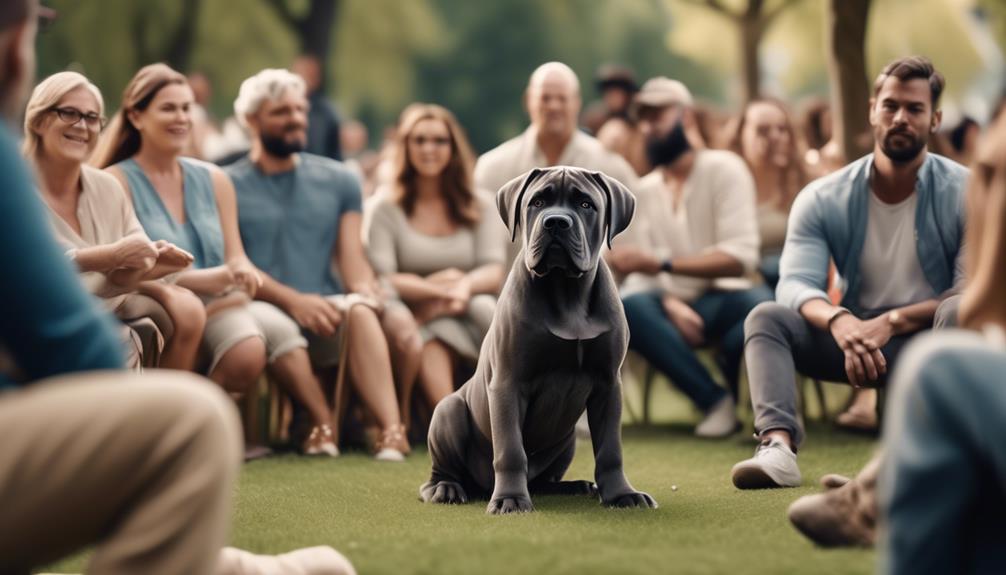
To ensure a well-rounded and obedient Cane Corso, it’s crucial to prioritize their socialization and training from an early age. Here are three important aspects to consider:
- Early exposure to various people, animals, and environments: Introduce your Cane Corso to different situations and individuals to help them become comfortable and confident. This will prevent them from becoming fearful or aggressive towards strangers or unfamiliar situations.
- Positive reinforcement training methods: Cane Corsos are highly intelligent and respond well to positive reinforcement techniques such as rewards, praise, and consistency. Use treats or toys as rewards for good behavior and ensure that training sessions are enjoyable and engaging.
- Establishing clear boundaries and leadership: Cane Corsos have a strong, dominant nature, so it’s important to establish yourself as the pack leader from the beginning. Set clear rules and boundaries, and consistently enforce them to prevent any dominance or behavioral issues.
Caring for a Cane Corso
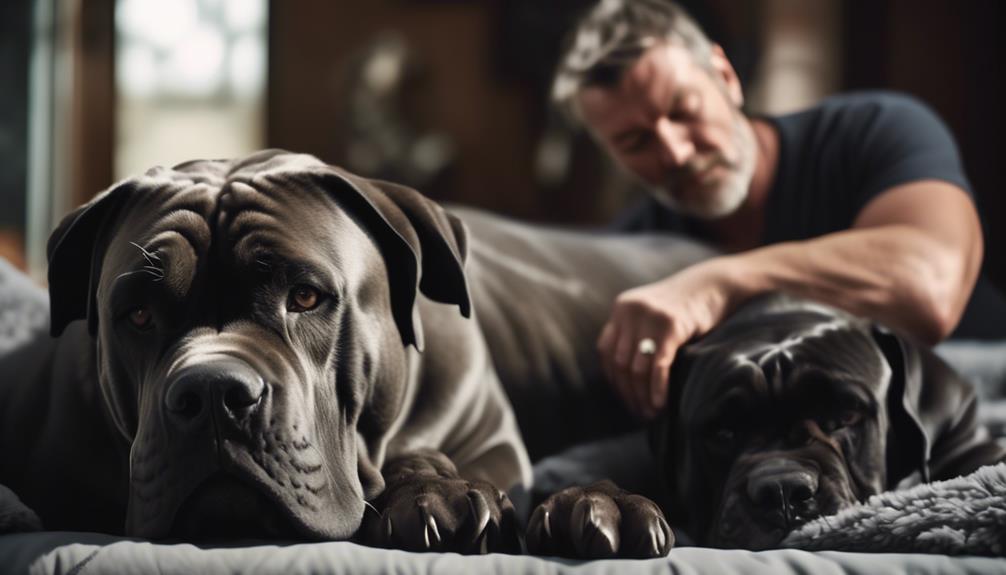
Caring for a Cane Corso requires dedicated attention to their exercise, socialization, and overall well-being. These large Italian dogs have high energy levels and need regular physical activity to stay in shape. They also require mental stimulation to channel their intelligence. Early socialization is crucial for them to develop good behavior and become well-adjusted companions. When it comes to adopting a Cane Corso, prioritize rescue organizations or reputable breeders who prioritize health and temperament. Owning a Cane Corso also means being prepared for higher expenses, including food, surgery, training, and pet-sitting. In terms of grooming, their short coat minimizes the need for extensive care. Regular brushing, nail trimming, teeth brushing, and ear cleaning are the main grooming requirements.
| Care Tips | Grooming Tips |
|---|---|
| Regular exercise and mental stimulation | Regular brushing to remove loose hair and maintain coat health |
| Early socialization | Nail trimming |
| Prioritize adoption from reputable sources | Teeth brushing |
| Be prepared for higher expenses | Ear cleaning |
Health Concerns
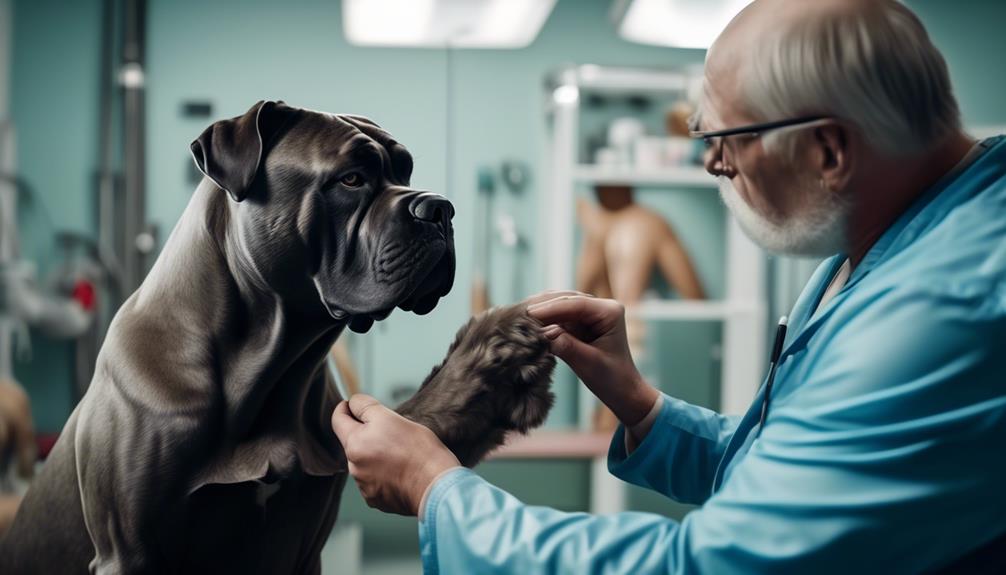
When it comes to the health of your Cane Corso, it’s important to be aware of potential health concerns that may arise. Here are three common health issues that Cane Corsos are prone to:
- Hip dysplasia and elbow dysplasia: These are developmental conditions where the hip or elbow joints don’t form properly, leading to pain and lameness. Regular vet checkups and early detection are crucial for managing these conditions.
- Heart disease and bloat: Cane Corsos are more likely to develop heart problems, such as dilated cardiomyopathy. Bloat, or gastric dilatation and volvulus, is a life-threatening condition where the stomach twists. Immediate veterinary attention is necessary for both of these conditions.
- Eye problems and allergies: Cane Corsos can be prone to conditions like cherry eye, entropion, and allergies. Regular eye exams and proper allergy management are important to maintain their ocular health.
Grooming Needs
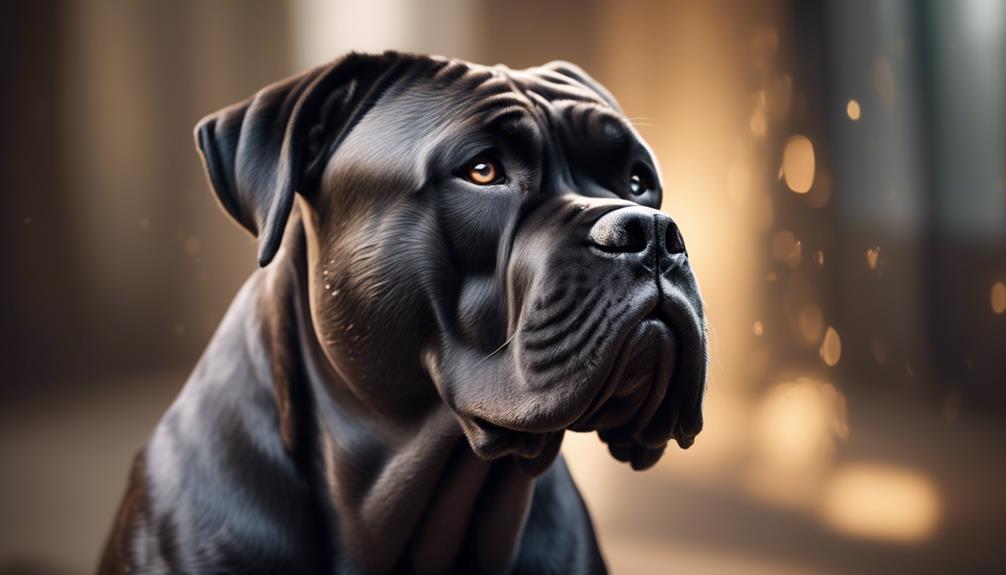
What are the specific grooming needs of a Cane Corso? Despite their large size, Cane Corsos have minimal grooming requirements due to their short, stiff coat. However, regular brushing is still necessary to remove loose hair and maintain coat health. Additionally, there are other grooming needs that should not be overlooked. Here is a table summarizing the grooming needs of a Cane Corso:
| Grooming Needs | Frequency |
|---|---|
| Brushing | Weekly |
| Nail trimming | Monthly |
| Teeth brushing | Regularly, ideally daily |
| Ear cleaning | Weekly |
Exercise and Mental Stimulation
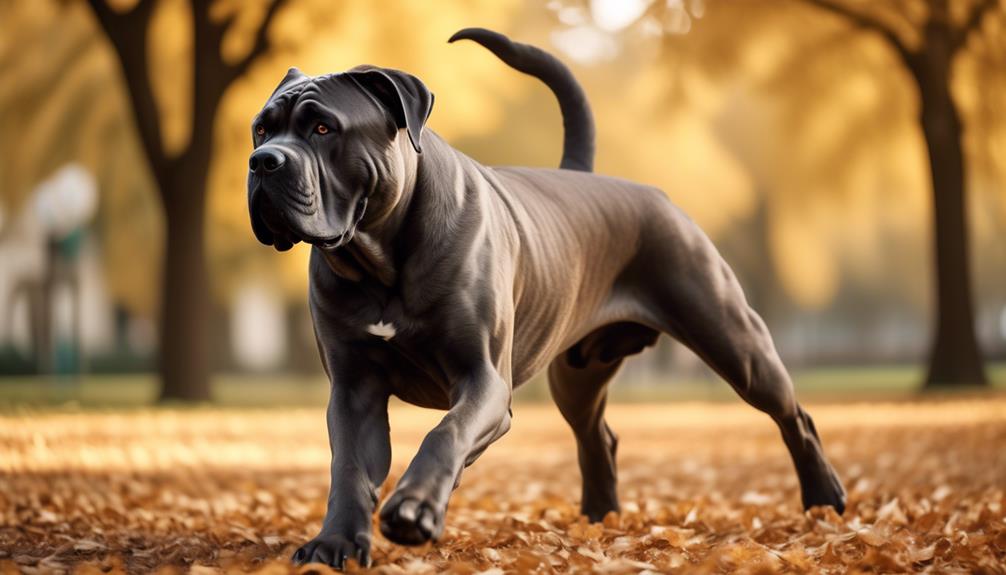
To ensure the overall well-being of your Cane Corso, it’s crucial to provide them with ample exercise and mental stimulation on a regular basis. Here are three key ways to keep your Cane Corso physically and mentally active:
- Daily Exercise: Your Cane Corso is a large and muscular breed that requires plenty of physical activity. Aim for at least 60 minutes of exercise each day, such as brisk walks, jogging, or playing fetch. This will help burn off excess energy and keep them in good shape.
- Mental Stimulation: Cane Corsos are highly intelligent dogs that thrive on mental challenges. Engage their minds with puzzle toys, obedience training, or interactive games. This will prevent boredom and help prevent destructive behaviors.
- Job Assignments: Giving your Cane Corso a job to do can provide a sense of purpose and fulfillment. Consider activities such as agility training, scent work, or even basic obedience tasks. This will keep them mentally engaged and satisfied.
Considerations for Ownership
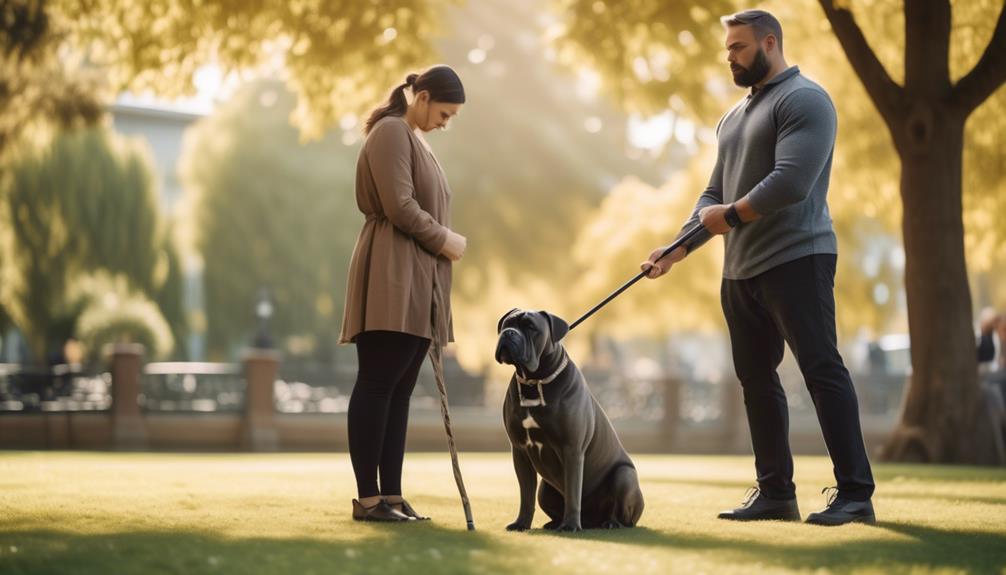
Before bringing a Cane Corso into your home, it is important to carefully consider the responsibilities and commitments that come with owning this powerful and intelligent breed. Here are some key considerations to keep in mind:
| Responsibility | Commitment |
|---|---|
| Provide regular exercise and mental stimulation | Cane Corsos are active dogs that require daily exercise |
| Properly socialize and train your dog | Early socialization and obedience training are crucial |
| Ensure a safe and secure environment | Cane Corsos need a fenced yard and should not be left unattended |
| Be prepared for potential health issues | Regular vet checkups and awareness of common health problems are important |
| Consider the financial implications | Cane Corsos can be expensive to maintain, including food, training, and veterinary care |
| Provide proper grooming and care | Regular brushing, nail trimming, teeth brushing, and ear cleaning are necessary |
Feeding and Nutrition
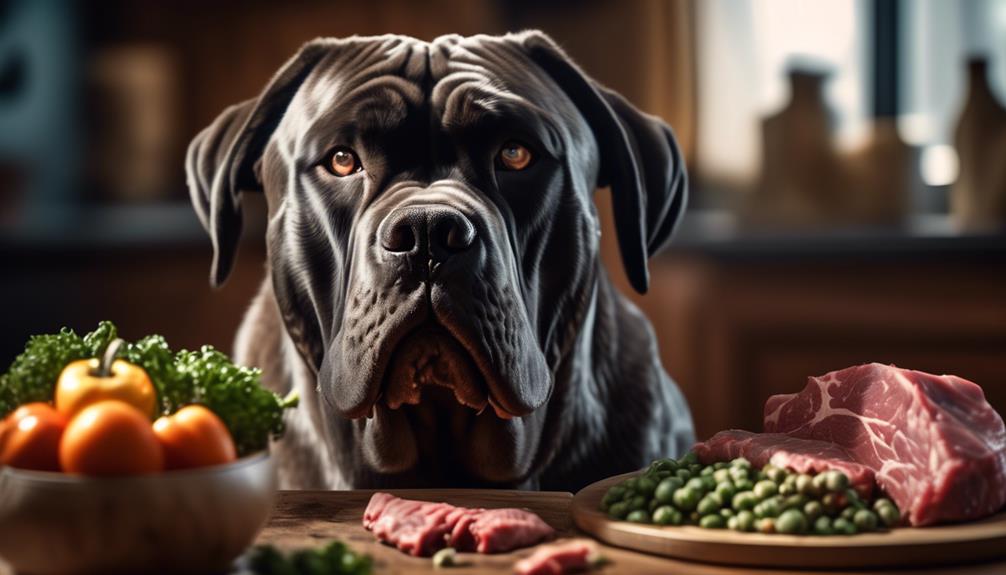
Now let’s explore the important aspect of feeding and nutrition for your Cane Corso, ensuring that your powerful and intelligent companion receives the proper sustenance to thrive.
To provide optimal nutrition for your Cane Corso, consider the following:
- Choose a high-quality dry dog food that’s specifically formulated for large breeds. Look for a brand that includes real meat as the first ingredient and avoids fillers or artificial additives.
- Feed your Cane Corso twice a day, measuring the food to maintain a healthy weight. The amount will depend on their size, age, metabolism, and activity level, but typically ranges from 4 to 5 cups per day.
- Regularly assess your dog’s body condition using the eye test and hands-on test. Adjust the portion size accordingly to prevent underfeeding or overfeeding.
Coat Care and Maintenance
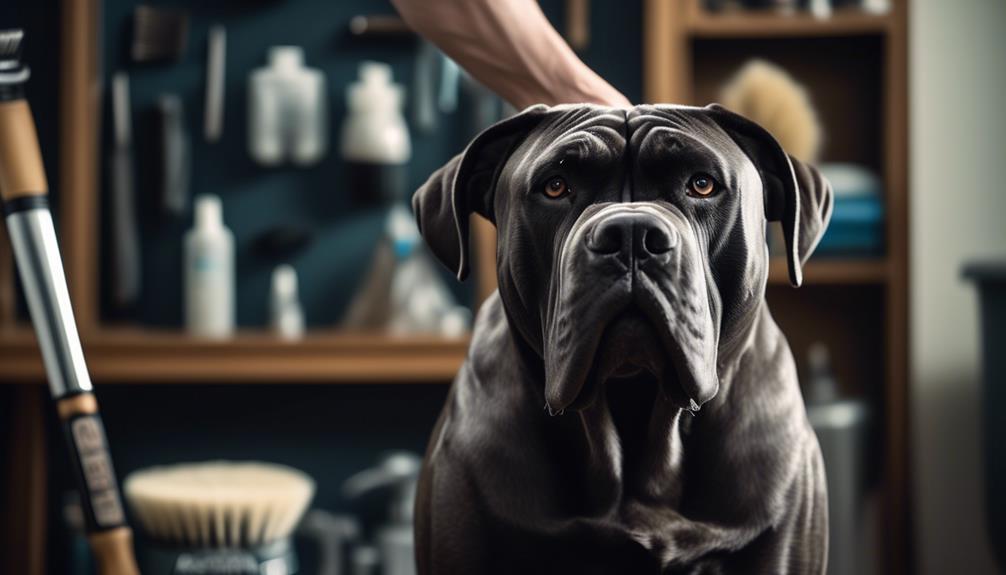
Maintaining the coat of your Cane Corso is essential for keeping their short, dense, and smooth fur healthy and looking its best. Despite their short coat, they still require some grooming to keep them in top condition. Regular brushing is necessary to remove loose hair and prevent matting. This breed has minimal shedding, so weekly brushing should suffice. Additionally, their nails should be trimmed regularly to avoid discomfort and potential injury. Dental hygiene is also important, so make sure to brush their teeth regularly. Lastly, cleaning their ears is crucial to prevent infections. Use a gentle ear cleaning solution and a soft cloth to wipe away any dirt or debris. By following these grooming practices, you can ensure that your Cane Corso’s coat remains shiny and healthy.
| Grooming Needs | Frequency | Tips |
|---|---|---|
| Brushing | Weekly | Use a brush with short, firm bristles to remove loose hair. |
| Nail trimming | Monthly | Regularly check their nails and trim them to an appropriate length. |
| Teeth brushing | Daily | Use a dog-friendly toothpaste and toothbrush to maintain good oral health. |
| Ear cleaning | Monthly | Use a gentle ear cleaning solution to remove dirt and wax buildup. |
Frequently Asked Questions
What Are Some Common Training Challenges Specific to the Cane Corso Breed?
Some common training challenges specific to the Cane Corso breed include their intelligence and bossy nature. They require firm leadership and boundaries to prevent dominance. Socialization and early training are crucial. Consistent enforcement of rules and positive reinforcement will yield good results.
Are Cane Corsos Good With Other Pets, Such as Cats or Small Dogs?
Cane Corsos can have varying reactions to other pets. While some may get along well with cats or small dogs, others may be less tolerant. Proper socialization and supervision are essential to ensure positive interactions.
Can Cane Corsos Live in Apartments or Do They Require a Large Yard?
Cane Corsos can live in apartments, but they require plenty of exercise and mental stimulation. They have a strong need for physical activity, so a large yard or access to outdoor spaces is beneficial.
How Do Cane Corsos Handle Extreme Weather Conditions, Such as Hot Summers or Cold Winters?
In extreme weather, such as hot summers or cold winters, Cane Corsos need proper precautions. Provide shade and fresh water in the heat, and shelter and warmth in the cold. Monitor for signs of discomfort and adjust accordingly.
What Are Some Common Misconceptions About Cane Corsos That Potential Owners Should Be Aware Of?
Some common misconceptions about Cane Corsos that potential owners should be aware of are their perceived aggression, high exercise requirements, and difficulty in training. However, with proper socialization, training, and love, they can be loyal and well-behaved companions.
What are the similarities and differences between the Cane Corso and Goberian dog breeds?
The Cane Corso and Goberian dog breed characteristics have some key similarities and differences. Both breeds are known for their intelligence and loyalty, but the Cane Corso is a powerful and imposing guardian, while the Goberian is a friendly and social crossbreed between a Golden Retriever and a Siberian Husky.
Conclusion
In conclusion, the Cane Corso is a remarkable breed that offers both loyalty and protection.
Their majestic presence and strong physique make them excellent guard dogs, while their loving and docile nature make them wonderful companions.
With proper socialization, training, and care, they can thrive in any loving home.
So, if you’re looking for a devoted and powerful companion who’ll always have your back, the Cane Corso is the perfect choice.




